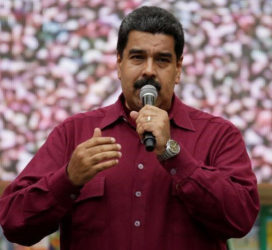QUITO, Ecuador, (Reuters) – The Venezuelan Supreme Court may have amended part of its explosive decision to take over the opposition-led congress, but it still gives embattled leftist President Nicolas Maduro broad new powers over the OPEC nation’s vast oil wealth.
The reversal on Saturday came after political leaders worldwide and street protestors at home accused the pro-government court of effectively making Maduro a dictator.
While the court backed off its Wednesday decision to fully take over the legislative branch, it left in place sweeping new authority for Maduro to cut oil deals on behalf of PDVSA, the state-run oil company, without congressional approval.
Maduro’s cash-strapped government now has the autonomy to sell stakes in Venezuela’s oil fields, which contain the world’s largest reserves, or launch new joint ventures with foreign firms.

The court action sets the stage for a protracted legal and political fracas that could spook foreign inves-tors and further undermine the nation’s efforts to stabilize PDVSA, said opposition lawmakers and industry experts. The state-run firm is already reeling from lower oil prices, a cash-flow crisis and chronic operational problems that have crippled its ability to serve customers worldwide.
The fight centres on a constitutional requirement that the National Assembly approve PDVSA contracts of “national public interest” with outside companies. In addition to Maduro’s legislative opponents, Venezuela’s attorney general – a longtime government ally – has called the court decision to bypass the assembly unconstitutional.
The legislature – which has been controlled by members opposing Maduro’s government since late last year – has warned investors that oil deals would be invalid without assembly approval.
Opposition lawmakers slammed state-run Russian oil major Rosneft, for instance, after it paid $500 million last year to increase its stake in the Petromonagas joint venture, to 40 percent from 16.7 percent, without legislative approval.
Rosneft – a major PDVSA partner at a time when relations between Caracas and Moscow have grown increasingly cozy – said the deal was legal. But the episode underscored the potential legal quagmire for investors.
Following the court’s action on Saturday, opposition leaders vowed to continue challenging the validity of oil deals it has not approved.
“This is desperation for dollars,” opposition lawmaker Elias Matta, the vice-president of the congressional energy and oil commission, told Reuters. “Let it be clear that any company created under this scheme will be null – totally null.”
Venezuela’s Information and Oil Ministries, along with PDVSA, did not immediately respond to a request for comment.
The imbroglio could hamper investments from wary multinational companies, especially those that are subject to stricter regulatory scrutiny at home.
On Thursday, National Assembly head Julio Borges tore up the Supreme Court order on the steps of the legislature, an image likely to unsettle corporate boardrooms. Other major oil players in Venezuela include U.S. major Chevron Corp and China’s state-owned CNPC.
Investor uncertainty, in turn, could further undermine Venezuela’s ravaged economy, which depends on PDVSA for more than 90 percent of export revenue as millions face food shortages and runaway inflation.
In theory, the court’s decision would allow Maduro’s government the power to do anything short of privatizing PDVSA without approval of the National Assembly, said Francisco Monaldi, a fellow in Latin America energy policy at the Baker Institute in Houston.
“But the legal ground could not be shakier if there is a change in government,” he said. “As a result of all this international scandal, foreign investors will be less likely to invest.”
Firebrand Hugo Chavez, president until he died in 2013, led a wave of oil nationalizations in Venezuela as part of his self-styled “21st century Socialism.” The policies have left many oil fields less productive and lacking investment.
National oil output tumbled last year on the back of constant refinery outages, an outflow of talent, and shortages of basic equipment in oil fields and imported diluents needed for blending with Vene-zuela’s heavy crude.
Amid mounting debts, Venezuela has sought to sell stakes in oil fields to bolster its dwindling coffers before a deadline to pay about $3 billion in bond obligations this month, sources say.
On Friday, Venezuelan bonds tanked on worries about the impact of the latest crisis on the country’s credit-worthiness.
It is unclear if the initial Supreme Court decision – the one that sparked global outrage – was prompted by an imminent plan to sell an oil field stake or create a new oil venture.
Reuters reported in March that PDVSA was negotiating a business deal with Rosneft and had offered the state-led company a stake in the Petropiar joint venture.
The offer has not been confirmed, and it remains unclear if Rosneft, which has become an increasingly key source of financing for PDVSA, is interested.
PDVSA is also relying on Rosneft to help it meet its looming bond payments, Reuters reported on Friday. It is unclear if the deal will go through or what Rosneft might get in exchange.
Late last year, Venezuela used 49.9 percent of its shares in U.S. subsidiary Citgo as collateral for loan financing from Rosneft. The move enraged opposition politicians who argue a desperate government is mortgaging prized national assets.
PDVSA and the Oil Ministry have not responded to repeated requests for comment on potential deals with Rosneft. Rosneft has declined to comment.
